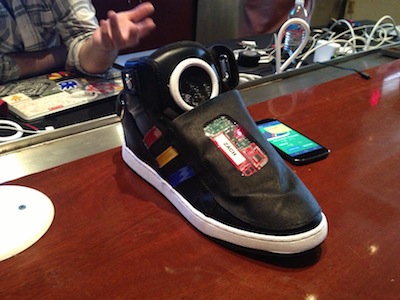Meet Google’s “talking shoe,” which aims to translate movement data in witty messages to users and their friends. The concept apparel, showcased at the search giant’s swanky SXSW Interactive headquarters, is part of a new arts project – “Art, Copy, Code” – which aims to breathe a social, life-like experience into everyday objects. “If standing still was a sport, you’d be world champion,” the trash-talking shoe projects on a monitor hanging over a rainbow-colored obstacle course after it senses I’ve been standing still.
At a distance, users seem a tad pathetic trying to trigger positive feedback from the shoe. But when I strapped it on, I felt oddly compelled to impress my new automated coach. Combining coaching (even robotic coaching) made lifeless data unexpectedly motivational. Essentially, it’s Richards Simmons in a shoe.
In case critics think this is another one of Google’s flights of profitless creative fancy, Arts Copy Code is deliberately about improving advertising. “It’s explicitly aimed at how translating how Silicon Valley thinks about technology into how creative agencies think about advertising,” says project lead Aman Govil.
Brands such as Nike, who outfit professional athletes with health-tracking shoes and bracelets, could broadcast an athlete’s spring-training performance in realtime. Rival athletes’ apparel could trash talk one another automatically.
It’s still (very) early days for the arts project. The talking shoe (and shoe strap) concept was developed through a grant to electronics agency Yes Yes No. Google plans to open up the project to more everyday objects in the near future. One hypothetical use-case, imagines Govil, is an alarm block that sends snarky messages to co-workers if users have to hit the snooze on their alarm clock more than three times.
There’s been heightened attention to research that quantifies how much our friends affect our weight, success, and personal lives. University of San Diego political scientist and Connected author James Fowler found that having an obese friend can significantly increase people’s chances of also having their own set of marshmallowy love handles. And it’s no secret that a spirited friend can get us up at 5 a.m. for a morning run as much as they can tempt us into finishing their plate of fries.
Health startups have attempted to “gamify” good behavior by encouraging users to share personal goals with friends. Nike+ FuelBand, for instance, shares users’ exercise habits with their friends on the personal social network, Path.
This project attempts to remove the barrier presented by current products. The social aspect has always required one extra step of human effort. However fast a one-word message of encouragement could take to type about a friend’s morning run, the minor inconvenience is enough to seriously limit engagement. This new automated personality seems to have a place, especially when we’re all too busy to be personal.
Currently the project is just a concept. There’s no need to jump over to the Google Play store and find the buy link. But Google Glass was just a concept at one point, too.
